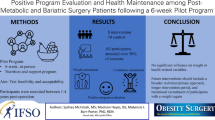Abstract
Background
Many insurance payors mandate that bariatric surgery candidates undergo a medically supervised weight management (MSWM) program as a prerequisite for surgery. However, there is little evidence to support this requirement. We evaluated in a randomized controlled trial the hypothesis that participation in a MSWM program does not predict outcomes after laparoscopic adjustable gastric banding (LAGB) in a publicly insured population.
Methods
This pilot randomized trial was conducted in a large academic urban public hospital. Patients who met NIH consensus criteria for bariatric surgery and whose insurance did not require a mandatory 6-month MSWM program were randomized to a MSWM program with monthly visits over 6 months (individual or group) or usual care for 6 months and then followed for bariatric surgery outcomes postoperatively. Demographics, weight, and patient behavior scores, including patient adherence, eating behavior, patient activation, and physical activity, were collected at baseline and at 6 months (immediately preoperatively and postoperatively).
Results
A total of 55 patients were enrolled in the study with complete follow-up on 23 patients. Participants randomized to a MSWM program attended an average of 2 sessions preoperatively. The majority of participants were female and non-Caucasian, mean age was 46 years, average income was less than $20,000/year, and most had Medicaid as their primary insurer, consistent with the demographics of the hospital’s bariatric surgery program. Data analysis included both intention-to-treat and completers’ analyses. No significant differences in weight loss and most patient behaviors were found between the two groups postoperatively, suggesting that participation in a MSWM program did not improve weight loss outcomes for LAGB. Participation in a MSWM program did appear to have a positive effect on physical activity postoperatively.
Conclusion
MSWM does not appear to confer additional benefit as compared to the standard preoperative bariatric surgery protocol in terms of weight loss and most behavioral outcomes after LAGB in our patient population.



Similar content being viewed by others
References
Jamal MK, DeMaria EJ, Johnson JM et al (2006) Insurance-mandated preoperative dietary counseling does not improve outcome and increases dropout rates in patients considering gastric bypass surgery for morbid obesity. Surg Obes Relat Dis 2:122–127
Gastrointestinal surgery for severe obesity (1991) NIH Consensus Statement, March 25–27 1991 9(1):1–20
Ren CJ, Fielding GA (2003) Laparoscopic adjustable gastric banding: Surgical technique. J Laparoendosc Adv Surg Tech A 13:257–263
Gulkarov I, Wetterau M, Ren CJ, Fielding GA (2008) Hiatal hernia repair at the initial laparoscopic adjustable gastric band operation reduces the need for reoperation. Surg Endosc 22:1035–1041
Robinson J, Lupkiewicz S, Palenik L et al (1983) Determination of ideal body weight for drug dosage calculations. Am J Hosp Pharm 40:1016–1019
Morisky DE, Green LW, Levine DM (1986) Concurrent and predictive validity of a self-reported measure of medication adherence. Med Care 24:67–74
Chevallier JM, Paita M, Rodde-Dunet MH et al (2007) Predictive factors of outcome after gastric banding: a nationwide survey on the role of center activity and patients’ behavior. Ann Surg 246:1034–1039
Hibbard JH, Mahoney ER, Stockard J, Tusler M (2005) Development and testing of a short form of the patient activation measure. Health Serv Res 40:1918–1930
Hibbard JH, Mahoney ER, Stock R, Tusler M (2007) Do increases in patient activation result in improved self-management behaviors? Health Serv Res 42:1443–1463
Jeffrey RW, Wing RR, Sherwood NE, Tate DF (2003) Physical activity and weight loss: does prescribing higher physical activity goals improve outcome? Am J Clin Nutr 78:684–689
University of Maryland Medical Center (2008) Medically supervised diet documentation. Available at http://www.umm.edu/weightloss/supervised_diet.htm. Accessed 17 June 2011
Jantz E, Larson C, Mathiason M, Kallies K, Kothari S (2009) Number of weight loss attempts and maximum weight loss before Roux-en-Y laparoscopic gastric bypass surgery are not predictive of postoperative weight loss. Surg Obes Relat Dis 5(2):208–211
Williams B, Melvin W, Torquati A, Richards W (2008) Impact of insurance mandated weight loss before bariatric surgery. Surg Obes Relat Dis 4:354–355
Madan A (2006) Insurance mandated preoperative dietary counseling does not improve outcome and increases drop-out rates in patients considering gastric bypass surgery for morbid obesity. Surg Obes Relat Dis 2:417–418
Ochner C, Puma L, Raevuori A, Teixeira J, Geliebter A (2010) Effectiveness of a prebariatric surgery insurance-required weight loss regimen and relation to postsurgical weight loss. Obesity 18:287–292
Alami RS, Morton JM, Schuster R et al (2007) Is there a benefit to preoperative weight loss in gastric bypass patients? A prospective randomized trial. Surg Obes Relat Dis 3:141–145; discussion 145–146
Livhits M, Mercado C, Yermilov I, Parikh J, Duston E, Mehran A, Ko C, Gibbons M (2009) Does weight loss immediately before bariatric surgery improve outcomes: a systematic review. Surg Obes Relat Dis 5:713–721
Talarico J, Torquati A, McCarthy E et al (2010) Pre-Lap-Band group education in Medicaid population: does it really make a difference? Surg Obes Relat Dis 6:356–360
El Chaar M, McDeavitt K, Richardson S et al (2010) Does patient compliance with preoperative bariatric office visits affect postoperative excess weight loss? Surg Obes Relat Dis 6(3 Suppl):S11
Martin M, Beekley A, Kjorstad R, Sebesta J (2010) Socioeconomic disparities in eligibility and access to bariatric surgery: a national population-based study. Surg Obes Relat Dis 6:8–15
Disclosures
Drs. Ren and Fielding are on the Medical Advisory Board for Allergan. They receive research grant funding from Allergan; however, none of the research in the present report was supported by Allergan. Drs. Parikh, Dasari, McMacken, and Ogedegbe have no conflicts of interest or financial ties to disclose.
Author information
Authors and Affiliations
Corresponding author
Additional information
Funded by 2009 SAGES Research Grant Award.
Presented at SAGES 2011 Annual Meeting; El Paso, TX.
Rights and permissions
About this article
Cite this article
Parikh, M., Dasari, M., McMacken, M. et al. Does a preoperative medically supervised weight loss program improve bariatric surgery outcomes? A pilot randomized study. Surg Endosc 26, 853–861 (2012). https://doi.org/10.1007/s00464-011-1966-9
Received:
Accepted:
Published:
Issue Date:
DOI: https://doi.org/10.1007/s00464-011-1966-9




